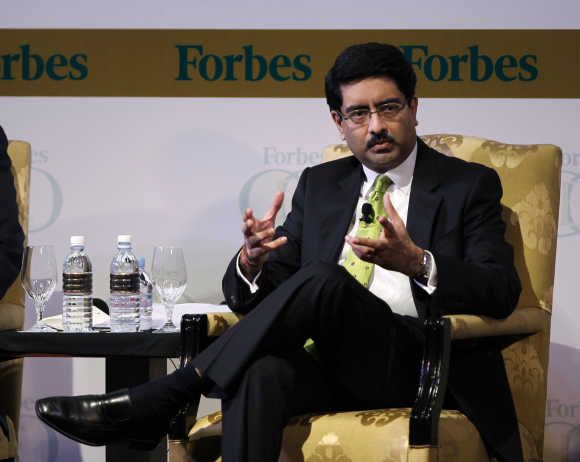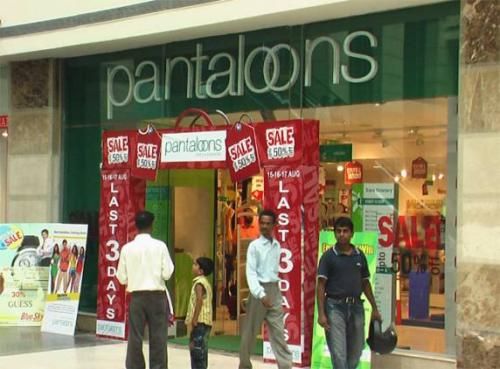 | « Back to article | Print this article |
About the secret of Birla's success, old-timers recall that one of his first moves was to set the retirement age for group executives at 60 years.

When Kumar Mangalam Birla took over as a 28-year-old inexperienced head of the Aditya Birla group in 1995, not many had expected the scion to break all records in terms of market value, revenue and profit in the next 20 years.
Today, under Birla, 47, the Aditya Birla group is a $40 billion conglomerate with 120,000 employees and is the only Birla group in manufacturing that survived the liberalisation of 1991.
Since his takeover of the group named after his father, Birla made sure that the only way to grow was through mergers and acquisitions across businesses.
Hence, be it telecom, commodities or the retail business, the group took over a clutch of companies in India and abroad - adding to family wealth though it is unlisted Essel Mining & Industries, which accounts for a substantial part of Birla's personal net worth, estimated by Forbes at $9.2 billion last September.

Birla, who prefers to keep a low profile, is nowadays busy consolidating operations of the group and plans to sell stakes in his retail vertical to a bunch of private equity investors.
This comes within months of his selling the group's business process outsourcing business, Minacs, for $260 million.
Birla is now offering stakes in the loss-making retail business so that fresh capital can be invested, but private equity investors are lukewarm to the idea.
About the secret of Birla's success, old-timers recall that one of his first moves was to set the retirement age for group executives at 60 years.
Soon, Birla brought in professionals from across the corporate sector in order to revive the group's fortunes.
Two successive events showed that when it came to taking on entrenched adversaries, Birla was not be cowed down.

First, in 2001 Birla bought 10.5 per cent in Larsen & Toubro from India's most powerful business family, the Ambanis, after they failed to take over the company because of protests by employees and institutional shareholders.
Birla, who had a sprawling cement business under Grasim, was keen to take over Larsen & Toubro's cement business.
As expected, the Larsen & Toubro management led by its gutsy managing director and chief executive officer A M Naik fought back, but Birla remained committed to his goal of taking control of the cement company.
Finally in 2003, as a peace formula, Larsen & Toubro's cement business was hived off and was given to Birla, and the Aditya Birla group in turn sold its stake to an Larsen & Toubro employees trust.
Another important early decision of Birla was to get into the wireless telephony business in association with AT&T and another revered Indian business house, the Tatas.
The company was launched with much fanfare but soon cracks appeared over various issues.

The bonhomie with the then Tata group chairman, Ratan Tata, evaporated after Birla wrote to the government how Tata's separate cellular phone business, Tata Teleservices, was hurting the joint venture.
Meanwhile, AT&T exited the company by selling its stake to Tata and Birla.
In 2006, the Tatas sold their stake to Birla at a substantial premium. Birla quit the Tata Steel board in August 2006 as relations between the two groups deteriorated.
Today, Idea Cellular is one of India's top three wireless telephony companies with a market value of Rs 58,700 crore even as Tata Teleservices struggles to make money.
Enthused by his successes in India, Birla took the biggest gamble of his life in 2007 when he bought North American aluminium product maker Novelis for $6 billion.
This was the biggest acquisition ever by the group and showed the risk-taking ability of this graduate of the LondonBusinessSchool.
Following the Lehman Brothers crisis, many analysts doubted Birla's acquisition, but as the US economy turns around, Novelis is back in business.
Birla is, meanwhile, consolidating his other businesses, carbon black, retailing and financial services.
The group became the world's largest maker of carbon black in 2011 after it acquired Georgia-based Columbian Chemicals for $875 million.

Birla took over the Future group's Pantaloons business for Rs 1,600 crore in 2012.
In the same year, the group bought 27.5 per cent in Living Media, a Delhi-based media company, as a financial investor.
Education is an area close to Birla's heart.
As a father of three, Birla spends a lot of time with his family and helps wife Neerja, who is running schools in South Mumbai, with ideas.
Birla wants to be a serious player in the education sector in the years to come.
He is also slowly taking over the businesses, including Century Textiles, set up by his grandfather B K Birla, according to his wishes.
The setbacks
While Birla ensured the group moved at breakneck speed, his journey was not without setbacks.

Birla and his flagship firm Hindalco were named in a first information report filed by the Central Bureau of Investigation (CBI) in 2013 for being allotted a coal mine by the government.
Though after an investigation the CBI submitted a closure report in court, the judge has slammed the investigating agency for hastily closing cases and has asked for more evidence.
The CBI now plans to inquire further, it filed a second report last week against Hindalco and unknown officials, this time on the allotment of the coal mine in Talabira I.
After registering the case, the CBI searched offices of the company.
Hindalco has denied any wrongdoing in the allotment of the mine to Indal in 1994, when it was managed by a multinational corporation.
Another setback was when the Reserve Bank of India rejected the group's application for a banking licence.

Birla is still keen on the licence and is laying the groundwork for a payment bank. In the telecom spectrum scam, the Supreme Court in 2012 cancelled three licences of Idea Cellular and the company was fined by the government.
Idea Cellular, however, moved on to invest more in subsequent auctions of spectrum.
In the coming years, insiders say, Birla will focus on his goal of raising the share of his group's overseas revenues from the present 50 per cent.
Birla may be breathing easy for now, but it will not be long before the young chairman picks up a big takeover target.